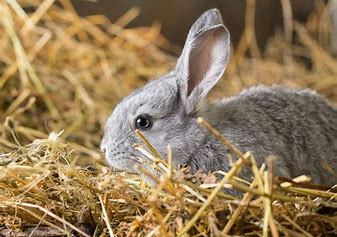

The normal color of urine from rabbits is yellow. Sometimes the urine can become red, pink, brown, or orange. This condition, often simply called “red urine,” can occur in healthy rabbits as well as those who are ill.
Causes of red urine
Plant pigments: In healthy rabbits, the red color of urine can be due to porphyrins and other plant pigments that have not all been identified. Sometimes diets with large amounts of plants high in beta-carotene, such as carrots and spinach, can cause the reddish discoloration. Ingestion of pine or fur needles has resulted in red urine as well. The discoloration is unpredictable: two rabbits may be on the identical diet, and one may have red urine, and the other not. Generally, the changes in urine color caused by diet are intermittent and only last 2-3 days.
Antibiotics: The administration of some antibiotics may increase the levels of pigments in the urine.
Stress: Some have suggested that stress or even a change of season may result in reddish discolored urine in some rabbits.
Dehydration: Dehydration will concentrate the urine, causing it to become darker in color and intensifying any pigmentation that is present.
Blood: If the red coloration is due to hematuria (the presence of blood in the urine), it is a sign of disease in the urinary tract, such as:
Kidney or bladder infection
Kidney or bladder stones
Kidney or bladder cancer
Bladder polyps
Blood in secretions from the uterus or vagina normally appear as a bloody discharge on the vulva, or as several bloody drops before or after urination. If the rabbit is not seen urinating, the blood may appear to be uniformly mixed in the urine found in the cage. Secretions from the reproductive tract that may cause red urine in nonsprayed females may be due to:
Endometrial hyperplasia (thickening of the lining of the uterus)
Uterine infection
Uterine cancer
Uterine polyps
Abortion
Bilirubin and urobilinogen: In very rare instances, the discoloration of the urine may be due to the presence of chemicals called bilirubin and urobilinogen. Increased levels of bilirubin and urobilinogen may be found in the blood and the urine if the rabbit has liver disease or her blood cells are being destroyed.
Making a diagnosis
A veterinarian can test the urine quickly to determine if the discoloration of the urine is due to blood, bilirubin, or urobilinogen. If one of these is found, a complete physical is necessary.
A good medical history including urinary habits is very important. If the animal has been straining to urinate, attempting to urinate more often, or urinating smaller quantities (sometimes only several drops) each time, a urinary bladder problem is likely. The condition can be very serious in rabbits who are “blocked” (have an obstruction of the urinary tract, such as with a bladder stone, and are unable to pass urine).
Various tests of the blood and urine, including a culture and sensitivity may be used to confirm the diagnosis. Ultrasonography and radiography (x-rays) may also be helpful in determining the cause.
Treatment
If the discoloration of the urine is due to dietary pigments, no treatment is necessary. If there is an obstruction, the rabbit may need to be sedated or anesthetized while the obstruction is removed. Dehydrated rabbits will need to be given intravenous (IV) or subcutaneous (SQ) fluids. Depending upon the diagnosis, treatment may include surgery, antibiotics, or other medications.
Summary
Discolored urine should always be checked by your veterinarian. If your rabbit is not showing any changes in eating, urinating, or other behavior, you may simply need to take in a urine specimen to be tested. To obtain a urine specimen, have your rabbit urinate into a clean, empty litter box. Collect the urine with a syringe, and store it in a clean, covered container in the refrigerator for up to 8 hours. It is sometimes difficult to get a clean sample of urine from a rabbit this way, so you may need to take your rabbit to the veterinarian, who can collect the specimen. A specimen that is less than œ teaspoon in volume, contaminated with droppings, or not stored correctly can cause inaccurate test results.
If your rabbit is straining to urinate and producing little, if any, urine, she may be blocked, and should be seen by a veterinarian immediately.
 Contact Jaguza Support
Contact Jaguza Support